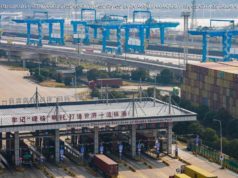 The US Trade Representative said in its annual report to Congress that continued dialogue with China over trade disputes, backed up by formal complaints in the World Trade Organization when necessary, have yielded results for US companies, although „significant trade distortions“ remain.
The US Trade Representative said in its annual report to Congress that continued dialogue with China over trade disputes, backed up by formal complaints in the World Trade Organization when necessary, have yielded results for US companies, although „significant trade distortions“ remain.
China is now the second largest market for US goods exports, expanding 505 percent since joining the WTO in 2001, to $116 billion as of 2015, the report said.
Services exports reached $48 billion in 2015, an increase of 802 percent since 2001.
Since China joined the WTO, the United States has filed 20 WTO dispute cases against China, more than twice as many as any other WTO member.
Trump has taken a hardline with China, threatening to immediately impose 45 percent import tariffs on Chinese goods once he takes office, saying the world’s second biggest economy has stiffed the US through currency manipulation and illegal subsidies.
That antagonism has raised fears among US businesses that their exports to China will be threatened, especially since Beijing has signaled it will retaliate.
Strong support across America’s industrial „Rust Belt,“ and frustration over lost jobs blamed on globalization, helped carry Trump to victory in the November election.
But the Obama administration has repeatedly touted engagement and enforcement as tools it has used successfully with China to prompt it to open its markets.
However, the USTR acknowledges that more progress is needed, saying the current leadership in Beijing has not followed through on pledges to open the economy further.
„Many of the problems that arise in the US-China trade and investment relationship can be traced to the Chinese government’s interventionist policies,“ the USTR said.
Those practices, and the large role of state-owned enterprises in China’s economy, „continue to generate significant trade distortions that inevitably give rise to trade frictions. „
The USTR said „if China is going to deal successfully with its increasing economic challenges at home, it must allow greater scope for market forces to operate, which requires altering the role of the state in planning the economy. „
Major concerns remain about China’s protection of intellectual property rights, the country’s support for state-owned companies, subsidies, and lack of market access for agricultural goods, among others.






